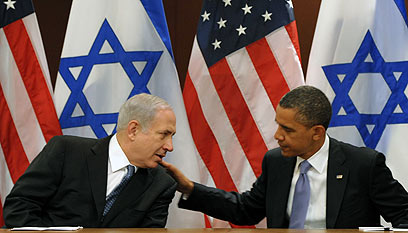
Steinitz told US won’t cut aid to Israel
Senior White House, Congress officials assure finance minister that budget cuts won't affect military aid to Jewish state
Steinitz met with senior White House officials and heads of Congress committees, who informed him that there was no plan to cut the military aid to Israel, which stands at some $3 billion a year.
Last week, US President Barack Obama laid out a $3.6 trillion plan to cut budget deficits partly by raising taxes on the rich, but Republicans rejected it as a political stunt and made clear the proposal has little chance of becoming law.
Vowing to veto any plan that relies solely on spending cuts to reduce deficits, the Democratic president's recommendations set the stage for an ideological fight with Republicans opposed to tax increases that will stretch through Election Day 2012.
An agreement signed in August 2007 states that the US will transfer Israel $30 billion in military aid from 2009 to 2018. The military aid is crucial for meeting Israel's defense needs and is taken into account in the Brodet Committee outline, which was drawn after the Second Lebanon War in a bid to increase the future defense budget and ensure that the State was allotting the required resources to defend its citizens.

According to the Brodet Committee's outline, the defense budget will grow by NIS 100 billion (about $27 billion) from 2008 to 2018. This sum will be comprised of a budget increment of NIS 46 billion ($12 billion), internal military efficiency estimated at NIS 30 billion ($8 billion) and the American aid.
The importance in maintaining the volume of aid was stressed recently following the plan to cut the defense budget in order to finance the social protest's demands.
As first reported by Ynet, Prime Minister Benjamin Netanyahu signed a plan to cut NIS 3 billion ($810 million) from the defense budget shortly before leaving for New York last week to address the United Nations General Assembly.
The cutback signed by Netanyahu, of NIS 3 billion in 2012 and another NIS 3 billion in 2013, does not significantly change the defense budget compared to the Brodet outline.
According to Treasury officials, the Brodet outline no longer exists after this cutback because the defense establishment is not exercising efficiency as required, while defense establishment officials say the cutbacks question the State's ability to endure an NIS 46 billion ($12.5 billion) budget increment within a decade, as required by the Brodet outline.
During the IMF meeting, Steinitz was scheduled to meet with 12 foreign ministers from across the world. On Thursday he met with his Chinese counterpart Xie Xuren, and the two discussed ways to tighten the economic cooperation between the countries on the backdrop of Israel's attempts to improve the ability of Israeli companies to infiltrate emerging markets in Southeast Asia.
The need to tighten economic relations with Southeast Asia and Latin America has increased recently in light of the financial crises in Europe and the US, which negatively affected Israeli exports and growth.
Following the repeated drop in demands in Europe and North America, the Treasury has decided to look into the option of exporting to China and India, where demands have been more stable in recent years.
- Follow Ynetnews on Facebook










